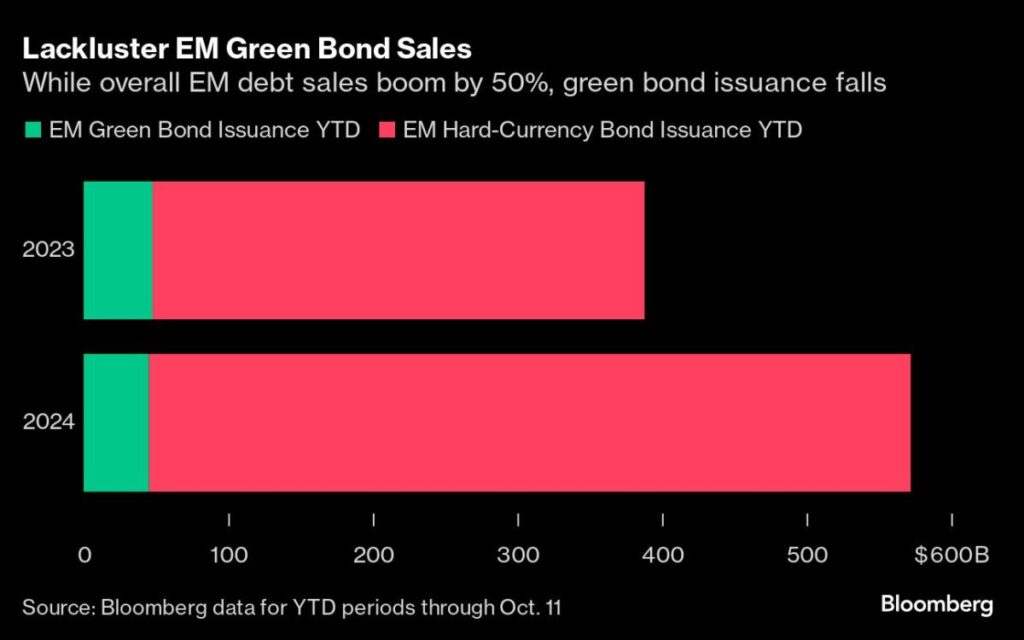(Bloomberg) — Sustainable investments in emerging markets are facing a reckoning as environmental, social and governance strategies crumble under the weight of ongoing capital outflows and the appeal of higher-yielding energy bonds.
Most Read from Bloomberg
ESG investments in developing nations have floundered over the course of the past year, with emerging markets recording a third year of consecutive outflows, largely due to tighter global monetary policies in both developed and emerging economies.
Even as interest rate cuts by the Federal Reserve promise new capital flows into developing economies, backers of sustainable debt confront a harsh truth: Spearheading this year’s returns are bonds issued by borrowers with tarnished ESG reputations, raising questions about the financial viability of sustainable investing strategies.
Companies in the materials, utilities and industrials sectors have provided some of the best returns in emerging markets this year. Bonds from India’s Vedanta Resources Ltd. and Latin America’s largest petrochemical company Braskem SA delivered about 41% and 34% in returns to investors respectively, compared to an average gain of 7.7% for a Bloomberg index of USD-denominated emerging-market corporate bonds. Both companies have come under fire for dubious ESG practices in the past year.
“The return outcomes of bonds with poor ESG metrics in both sovereign and corporate universes within emerging markets have simply been better in recent quarters,” said Philip Fielding, co-head of emerging markets at Mackay Shields. That has dented “demand for the most restrictive ESG products,” he said, referring to strategies that exclude certain bonds.
While hard currency debt sales by developing nations, at $527 billion, increased by nearly 55% through Oct. 11 compared to the prior-year period, green bond sales in these countries — at $45 billion — contracted 5% from the year-ago period, according to data compiled by Bloomberg.
Only four new open-ended debt funds or exchange-traded funds dedicated to ESG causes in emerging markets have launched this year, with the latest coming to market in July, according to data compiled by Bloomberg Intelligence. This is a stark contrast to at least 10 ESG-labeled strategies that launched in 2023, the data show.
The outperformance in energy bonds is partially driven by investors searching for energy security amid escalating conflicts in Russia and Ukraine on the one hand and the Middle East on the other hand, with the latter accounting for a third of global crude supply. A gauge of implied volatility for Brent is hovering near its highest level in a year.
“There’s definitely been an undeniable trend toward energy security,” said Giulia Pellegrini, senior money manager for developing debt at Allianz Global Investors, which holds bonds of several energy companies. That “prompts investors to think that if you invest in energy-intensive names, you’re more likely than not to perform better in an environment that demands energy security.”
Shifting Mood
Investors are finding it hard to navigate diverging regulatory frameworks around sustainable investing, especially in emerging markets. “What’s challenging about EM is that you have so many different regulatory regimes and governments,” said Samuel Bevan, investment director for emerging market debt at Abrdn Plc. “You can’t have a one size fits all approach” in evaluating ESG performances, he said.
Meantime, the European Union’s crackdown on uses of the ESG label and ongoing political backlash in the US are also deterring investors. Case in point: Pacific Investment Management Co., Alliance Bernstein and the asset management units of Goldman Sachs Group Inc. and JPMorgan Chase & Co. have all withdrawn from the world’s largest climate alliance for investors this year.
The retreat by some US-based asset managers is “sending a little bit of less encouraging signals to the market,” said Esther Law, senior portfolio manager at Amundi SA.
Continued Effort
Still, money managers highlight the importance of including emerging market issuers in sustainable finance initiatives. For one, HSBC Holdings Plc’s asset management unit is teaming up with International Finance Corp. to create a joint fund, carrying the EU’s strictest sustainability designation, to support corporate bond issuers in emerging economies. The EU also plans to help reduce the costs of selling green bonds in poorer countries.
Abrdn’s Bevan, who manages a $151 million EM corporate bond fund that invests in companies aligned with the United Nation’s Sustainable Development Goals, said emerging markets provide ample opportunities for ESG goals, including reducing inequality and improving access to clean water and sanitation. “Where the government does support that kind of growth, then it can be a really fast growth process,” he said.
Among emerging issuers that have sold sustainable bonds this year are the Dominican Republic, which marketed $750 million of green bonds in June with a 6.6% coupon, and Engie SA. The Chilean arm of the French energy firm in April issued $500 million of 10-year green bonds with a coupon of 6.375%.
Still, fund managers remain under pressure to balance their ESG-investments in emerging markets and in more developed, less risky counterparts. If a bond sale is limited in size so that investors “are forced to keep it on their books for a long time without the possibility to trade it, there is no liquidity, they are likely to step back,” Pellegrini said.
Most Read from Bloomberg Businessweek
©2024 Bloomberg L.P.
Read the full article here


